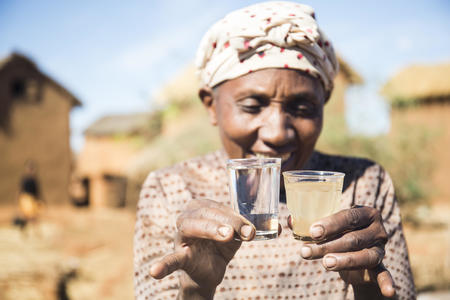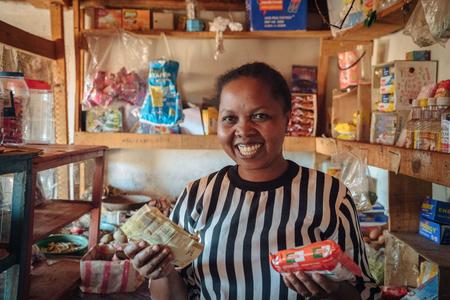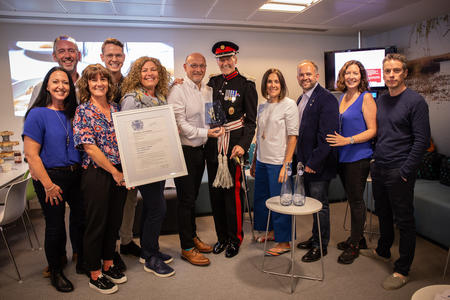Belu and WaterAid: a decade of doing business differently

This June marks ten years of our partnership with Belu, the drinks business that puts people and the environment first.
Since 2011, Belu has invested 100% of their net profits – totalling over £5 million – into our work to end the water crisis. In doing so, they've already transformed the lives of over 330,000 people around the world, creating a ripple effect of positive change that will last for generations to come.
We’re taking a look at everything we’ve achieved together so far – from empowering women in rural Mali to celebrating successes closer to home – with ten of our favourite highlights from this very special partnership:
1. Witnessing the transformational impact of clean water
In 2017, some of the Belu team travelled to Madagascar – where almost half the population doesn’t have access to clean water, and around 90% don’t have a decent toilet – to see the impact of our partnership first-hand.
They met people like Sabine, voluntary president of the water committee here in rural Beanamamy. As an active member of the local community, she knows only too well how things have changed since the installation of a gravity-fed water system in 2018 – the first time the village has ever had a reliable source of clean water.
The difference between water from the taps and from the river is clear – and so is the ripple effect it’s had on life here. Children are healthier, farmers have more time to tend to their crops and zebus, and people are able to focus on earning a decent living to support their families.
This pump is really changing our lives... Now things are different, we can focus more on our livelihoods [and] improve our lives at home.
2. Giving people the time they need to grow their business
When Francoise first moved to Ambatoantrano in central Madagascar, she had no choice but to get up at 3am and join the queues of people collecting dirty water that only made them sick. Most villagers depend on small-scale farming, so they needed to fetch enough not only for themselves, but for their crops and animals too.
Since the arrival of clean water in the village, people are not only healthier, but have more time to tend to their fields and raise livestock.
For Francoise, it’s also allowed her to focus on growing her small business and looking to the future – something that was impossible to imagine when days revolved around collecting enough water to survive.
My husband and I have a vision for our shop and the future of it.
3. Empowering women to become financially independent
In villages like Samabogo in rural Mali, women have few opportunities to be economically active. During the dry season, there’s little for them to do but wait until the next rains, when they will help their husbands in the fields. Without a way of earning their own money, women are dependent on their husbands to meet their families’ most basic needs.
We’re supporting two women’s groups, which are empowering members to learn new skills, earn a steady income, and take control of their own finances.
With the money they make from selling vegetables, soap and shea butter, mothers can buy clothes and medicine for their children, pay school fees, and cover household expenses. They can make their own decisions about what to spend and how much to save – without ever having to ask their husbands.
When a woman joins this group she feels empowered… you are independent. – Ruth Diallo, group president
4. Sharing skills for sustainable change
A mason and carpenter by trade, Souleymane is one of four mechanics in Samabogo, Mali, trained by WaterAid to maintain the area’s new water towers and tap stands.
By equipping residents like Souleymane with the skills and expertise they need to take care of problems, we’re making sure that communities don’t need to rely on us – or anyone else – to help when things go wrong. Local people are empowered to take ownership of the water systems, ensuring their transformative impact will continue long into the future.
I am proud to be one of the mechanics… When I go up to the water tower and stand up there it makes me very happy.
5. Supporting female entrepreneurs to thrive
Before clean water came to Chiteyeye, Malawi, it wasn’t easy to run a business here – especially because Hilda’s shop specialises in homemade drinks. The hours she had to spend walking to fetch water every day were hours when her business couldn’t trade.
Now there’s a water kiosk just a few metres away from Hilda’s home, she can keep her shop open all day long. As a result, her profits have increased more than five-fold, meaning she can support her family and even send extra money back to her home village.
6. Celebrating a truly innovative initiative
We’re so proud of Belu for being awarded not just one, but two prestigious Queen’s Awards: one for sustainability, and one for innovation.
We were delighted to host the team and Lord Lieutenant Ian Johnston for the presentation of their Award for Innovation in 2019, in recognition of their filter initiative, which sees business and hospitality venues replacing single-use bottles with filtered water on tap.
7. Showcasing Life in Madagascar
On World Water Day 2019, together we hosted an exhibition showcasing some of the incredible work of Ernest Randriarimalala, Voices from the Field Officer in Madagascar:
From capturing the island’s otherworldly landscapes, to immortalising the moment clean water arrives in a community, Ernest records life in Madagascar through his photos. You can see more of them on Instagram: @ernestrandriarimalala.
8. Tackling climate change
Belu’s environmental credentials are second to none: as part of their commitment to sustainability, they’ve made a 68% saving in CO2 emissions since 2010, turned almost 80 million old bottles into new ones, and been certified carbon-neutral. They’ve pledged to save 100,000 more tonnes of carbon emissions, and recycle over 2 million more kilograms of glass and plastic, over the next ten years.
That’s impressive, but it doesn’t stop there.
We know that the climate crisis is a water crisis – and that, as floods and droughts become more common, it’s the world’s most vulnerable who are hit the hardest.
Belu’s support is helping us to train people in water monitoring and management techniques, use our expertise to deliver flood-resistant water systems, and empower communities to build their resilience to climate change.
9. Investing in children's futures
Without access to clean water and decent sanitation, millions of children around the world are denied the education that will transform their futures. Time spent fetching water is precious time that should be spent learning. When they do get to school, a lack of decent toilets and washing facilities makes it hard for children – especially girls – to stay in the classroom.
By helping us reach more communities with life-changing water and sanitation, our partnership with Belu is helping thousands of children to overcome these barriers and get the education they deserve – opening up a world of opportunities, and changing their lives forever.
10. Looking ahead
Together, we’ve achieved so much over the past decade. But, with one in ten people around the world living without clean water close to home, there’s still a long way to go.
Belu has shown that there’s a better way to do business – one that puts people and the planet at the heart of every decision, without sacrificing their success.
So let’s raise a glass to that – and to the next ten years of our partnership!
A huge thank you to everyone at Belu, and to all their customers, for the part they’ve played in the success of this partnership so far. Every venue that chooses to serve Belu is choosing not only to put the planet first, but also to make a lasting difference to thousands of communities around the world – thank you.











